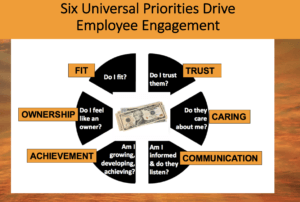Universal Priority: Do they care about me?
Having a caring workplace is one of the six drivers of employee engagement. These drivers (illustrated in the image below) are Fit, Trust, Caring, Communication, Achievement, and Ownership.
Do you have a caring workplace? This is important because people are social beings. Human connection is a basic need. Therefore, relationships matter. In addition, relationships offer support that can contribute to the meaningfulness of work. There is value to having a helpful network of support. And, across all generations, employees seek an organization that genuinely cares about each employee’s wellbeing.
Because people spend so much of their time at work, a caring workplace is essential. To clarify, work should nurture positive relationships. It can be an environment of understanding, community, and encouragement. This social aspect of work is vital to building a workplace where employees are engaged. When employees know that their managers and leaders believe they will do good work, their energy to accomplish the work flows.
Do you have a caring workplace?
A caring workplace is one where leaders genuinely care about employees, supervisors care about workers, and employees have friends at work.
Do leaders care about employees?
Engagement flows from the top downward. To clarify, when senior leaders are visible and show empathy and appreciation, employees are more engaged. The emotional connection between employees and the company leader matters. Most importantly, it impacts how employees feel about the company and their job.
In normal times, employees need to feel a sense of caring from the top. This is demonstrated through words and actions. And in times of stress or crisis, leaders must listen to employees and convey assurance through effective planning and action. If this capability falters, engagement rapidly declines due to lack of caring and lack of trust.
Do supervisors care about their employees?
 When managers/supervisors have a sincere interest in the well being of others, they take the time to know each employee they manage. They know them as a total person. For example, they know their talents, interests, and aspirations. Supervisors know how employees work best and learn best and what inspires them.
When managers/supervisors have a sincere interest in the well being of others, they take the time to know each employee they manage. They know them as a total person. For example, they know their talents, interests, and aspirations. Supervisors know how employees work best and learn best and what inspires them.
Managers must figure out what each employee does best and find ways for them to shine. This genuine caring and support results in positive attitudes and behaviors. In a caring workplace, employees have a greater desire to give back to the organization. Likewise, when employees know their managers/supervisors as individuals, it promotes employee engagement.
Often, through one-on-one employee meetings, supervisors can learn more about their employees and uncover actions that will enable each employee to thrive.
To sum up, managers play a vital role in promoting engagement in their direct reports.
In a caring workplace, employees get support.
Support is a vital driver of employee engagement. For example, managers must remove obstacles to optimize employee performance. In addition, they must provide the support needed to do one’s job right. Providing support makes an employee available to do the work. When employees have the resources and materials to do their jobs right, they are more engaged.
Do employees have friends at work?
 Camaraderie impacts engagement. When employees have friends at work, it promotes community and enjoyment. Social connections create positive feelings among workers. This can enhance dedication and effort.
Camaraderie impacts engagement. When employees have friends at work, it promotes community and enjoyment. Social connections create positive feelings among workers. This can enhance dedication and effort.
Research also indicates that social connections at work can enhance one’s sense of the meaningfulness of work. It may be that the why of work, the how of work, and the who of work are all important in contributing to meaningfulness of work. And meaningfulness contributes to engagement.
Caring matters!
 Having a caring workplace is important in the environment of work today. For example, with the increased use of technologies, employees can have fewer face-to-face interactions. This can increase feelings of loneliness and isolation. Loneliness at work is a growing problem for individuals.
Having a caring workplace is important in the environment of work today. For example, with the increased use of technologies, employees can have fewer face-to-face interactions. This can increase feelings of loneliness and isolation. Loneliness at work is a growing problem for individuals.
As employees work more virtually, it is a responsibility of managers and leaders to demonstrate that they genuinely care.
Survey employees
Now is the time to survey employee engagement. Determine if employees feel they have a caring workplace. Answer the following questions:
- Do senior leaders care about me?
- Does my immediate supervisor/manager care about me?
- Do I have the tools and equipment I need to do my job right?
- Do I have friends at work?
To sum up, take the time to focus on the human element. When you do, you can build a culture that thrives.
Contact Sheila
Above all, contact Sheila to help you build a more caring workplace. Sheila provides organizational culture, culture change, and employee engagement services. Her management consulting firm Workplace Culture Institute is based in Atlanta, serving clients globally.
Certainly, use the Contact Form to email Sheila.
